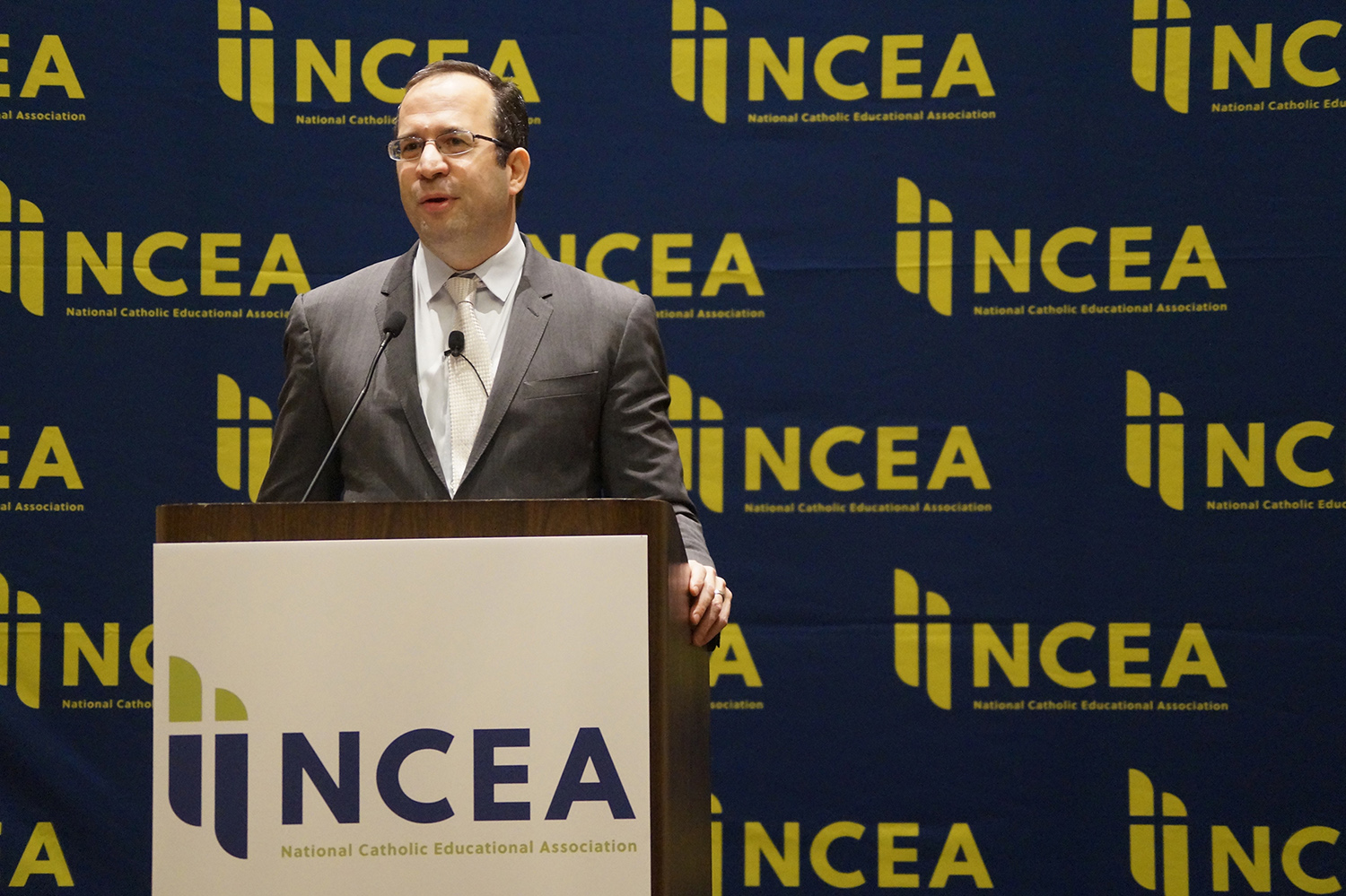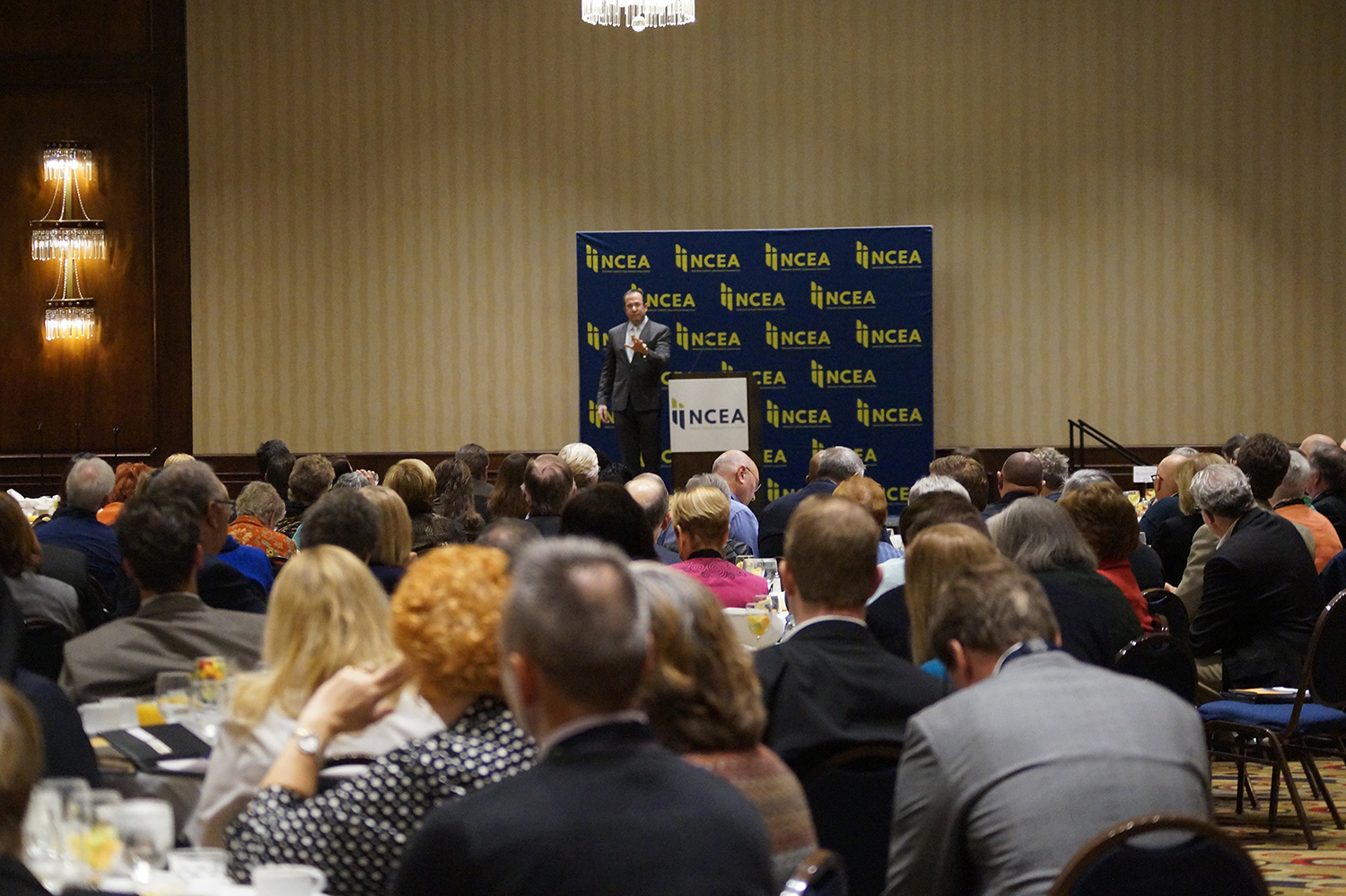The keynote speaker of the NCEA 2015 Catholic Leadership Summit was David Coleman, President and CEO of The College Board. Coleman discussed the unique, enduring contributions made by institutions of faith and learning to our society.
In his work, Coleman has been conscious of the role of Catholic schools as religious-based learning institutions and works to honor them, thinking about what is unique and beautiful about their contributions to our community.
Quite plainly speaking, I am devoted to the idea that the seeming boundary between public and Catholic education actually share profound purposes and powers. And those who seem to be in the more secular side of this world need to think again about the productive relationship of religious education.
Coleman’s keynote reflected on two major areas: religious learning and assessment.
There are four specific values that are cultivated in religious learning that have great promise in learning more broadly: productive solitude, restful excellence, reverent reading of shared things and a safe haven for the body and spirit.
Productive solitude is an essential component of a life of faith and crosses into the work of Catholic school education frequently. Coleman connected the Catholic educator’s training in solitude, which invites the relationship with the Spirit, is a great gift to the power of students in our care.
Restful excellence is the conscious ability to balance education with life in order to not only cultivate knowledge but to experience resilience. The other extreme – frenzied excellence, when students fill their schedules doing many things but not cultivating passion on one or two things – is not the answer to success at the college level and beyond. Instead, Coleman encourages educators to ready them for college through sustained excellence which allows young people more time for family and faith and to enjoy life as an adolescent.
Coleman stressed that one cannot read well, without reading reverently. “To read well is a kind of supplication, and the ability to see the crafted thing is so beautiful that you experience it with reverence.” Quoting C.S. Lewis, he continued, “In the face of the work of art, look and look again. See exactly what is there. Forget yourself. Get out of the way.”
Finally, Coleman stressed the importance of creating a safe haven for the body and spirit.
The gateway of higher education is the gateway of culture. The notion of community – at the heart of the religious experience – is another gift that education brings. I think it is about time we stop defensibly defending the right of religious education, we should start celebrating the gifts that religious education can bring.
The second part of the keynote reflected on the assessments that are currently going on in the country.
There’s been a lot of discussion about testing. Probably too much. Let me sum it up for you. Assessment without opportunity is dead. We don’t need more tests. We need more opportunities,” stated Coleman. “We must redefine everything we do to FOSTER opportunity.
There are four points to consider when creating opportunities:
1 – Assess only what students are already learning in the classroom and only what they are using over and over again.
Coleman shared with the audience the example of the word “synthesis.” “Synthesis” means to bring things together; yet “synthetic” can refer to something artificial. In the religious context, synthesis has profound meaning in our faith education. It is important for students to understand the meaning and context of words like “synthesis” versus those words traditionally dubbed “SAT words.”
Today, we need to shift preparation for the SAT and other standardized testing so that the preparation is the same as the necessary preparation for college. One of the steps in preparation is ensuring students are familiar and reverently understanding of the great conversations of our country – thoughts and statements from the likes of Abraham Lincoln and Martin Luther King, Jr.
Coleman believes sharing these great conversations is essential to the future of our community. He purposely and proudly shared the news that he sent St. Francis’s recent 2015 address to Congress to members of The College Board.
In this speech, Pope Francis entered the great conversation of this country. He was in conversation with King and Lincoln. If we want to be great, we need to return to that great conversation. And isn’t it time that we make sure students are part of that great conversation?
2 – Ensure all students claim the opportunities that they have earned.
We should stop allowing students to describe themselves as poor. We should acknowledge and move on to accelerate them forward. One of the greatest barriers to matriculation to the college level is not the ability to thrive in higher education but the accessibility to higher education in general. As educators, we must be mindful of our students’ abilities and needs in order to move them toward a meaningful future.
3 – Assessments must earn students and their families something worthwhile.
“It is not okay to tell students to take a test because they ‘have to.’ Teachers don’t buy it, students don’t buy it and parents don’t buy it.” Coleman stresses that we must put value and context on the information shared with families.
4 – The only things that change performance are productive practice and great courses.
Coleman shared the news that The College Board is committed to working with organizations in order to ensure all students have access and knowledge they need to succeed. They asked for support of all superintendents to reach those students who need test prep to yield productive practice.
Let’s agree not to waste the time of parents and students about assessment. People don’t care about increase or decrease in test schools. They care about opportunities for students. When we focus on the isolated moment of testing we miss the art and craft of practice that students and teachers do together. The College Board can’t do it alone. We know that we need to partner much more deeply with teachers and educators, and nonprofits, and with families. We need to work better with the people in this room. Assessment without opportunity is dead. We hope you will help us turn the page.
The presentation concluded with questions from the audience. Among them, was the question: “What do we, as educators, need to do to shift the school culture and foster enthusiasm in the classroom and beyond?”
Coleman responded that we must “challenge students to own their futures, to passionately learn beyond what they are tested on. We are in the unique situation in religious education in that we have the opportunity to create a connection which resembles a passionate learning of the Spirit. We should encourage this same passionate learning in academics, or non-academics as the case may be, to encourage the success of students.”
David Coleman will also be the keynote speaker at NCEA 2016 Convention & Expo, taking place March 29 – 31, 2016 in San Diego. Registration is now open.
David grew up in a family of educators and followed them into the field. He went to public school in New York City before enrolling at Yale University. At Yale, he taught reading to high school students from low-income families and started Branch, an innovative community service program for inner-city students in New Haven, Conn. Based on the success of Branch, David received a Rhodes Scholarship, which he used to study English literature at the University of Oxford and classical educational philosophy at the University of Cambridge in the U.K. He returned to the U.S. to work at McKinsey & Company for five years, where he led much of the firm’s pro bono work in education.
With a team of educators, David founded the Grow Network, an organization committed to making assessment results truly useful for teachers, parents and students. The Grow Network delivered breakthrough-quality reports for parents and teachers as well as individualized learning guides for students. McGraw-Hill acquired the Grow Network in 2005.
In 2007, David left McGraw-Hill and cofounded Student Achievement Partners, a nonprofit that assembles educators and researchers to design actions based on evidence to improve student outcomes. Student Achievement Partners played a leading role in developing the Common Core State Standards in math and literacy. David left Student Achievement Partners in the fall of 2012 to become president of the College Board.
David was named to the 2013 Time 100, the magazine’s annual list of the 100 most influential people in the world. He has been recognized as one of Time magazine’s “11 Education Activists for 2011” and was one of the NewSchools Venture Fund Change Agents of the Year for 2012. He is the proud father of two.

